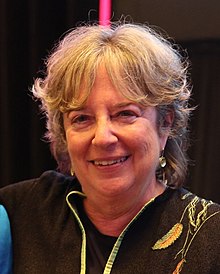Nan Aron
Nan Aron | |
|---|---|
 | |
| Born | 1948 (age 75–76) New York City, U.S. |
| Education | Oberlin College (BA) Case Western Reserve University (JD) |
| Occupation | Lawyer |
Nan Aron (born 1948) is an American lawyer[1] and the founder and president of Alliance for Justice (AFJ), a liberal judicial advocacy group in the United States.[2][3][4] Staunchly progressive, Aron has been a noted opponent of conservative judicial nominees in the United States.[5][6] She repeatedly called for former Presidents Bill Clinton[2] and Barack Obama to be more aggressive in nominating progressives to the bench,[7] and during George W. Bush's presidency, urged the Democrat-controlled Senate to consider Bush's nominees closely.[2][8] She is considered a key player in confirmation hearings for judicial nominees,[2] and, in 2005, was called "the Madame Defarge of liberal court watchers" in the Wall Street Journal.[5][9]
Career
[edit]Aron received her B.A. in sociology and Chinese from Oberlin College and her J.D. from Case Western Reserve University School of Law.[9][10] Prior to founding Alliance for Justice, Aron worked as a staff attorney for the ACLU's National Prison Project.[9][10][11] Aron went on to serve as a trial attorney for the United States Equal Employment Opportunity Commission,[9] where she litigated race and sex discrimination cases against companies and unions in federal and district courts. In 1979, Aron founded the Alliance for Justice,[9] and began investigating judicial nominees during Ronald Reagan's presidency.[2] She established the Alliance's Judicial Selection Project in 1985.[5]
Aron has taught at Georgetown and George Washington University Law Schools, and serves on the Dean's Advisory Council at American University's Washington College of Law.[12]
Aron authored Liberty and Justice for All: Public Interest Law in the 1980s and Beyond in 1989,[13][14] which the Harvard Law Review said was "[s]ure to evoke a new pledge of allegiance to public interest law",[15] as well as Justice in the Making—A Citizen's Guide in 1993 with Alliance for Justice.[12]
Aron referenced overcoming the dual challenges of being a woman and a Jew in the State Department in 2004.[10]
Personal life
[edit]Aron was born in a Jewish household in 1948 in New York City.[10] She is married to psychiatrist Bernard Arons; they have three children.[9]
References
[edit]- ^ Yeager, Holly (June 22, 2005). "Liberal campaigner ready for next big trial". Financial Times. Retrieved 26 May 2015.
- ^ a b c d e Savage, David G. (6 July 2001). "Court Nominee Warfare Opens". The Los Angeles Times. p. A5. Retrieved 4 July 2019.
- ^ Mauro, Tony (May 22, 2015). "Supreme Court 'Litmus Test' Emerges in White House Race". National Law Journal. Retrieved 26 May 2015.
- ^ Bravin, Jess (May 18, 2015). "Supreme Court Rules Felons May Sell, Transfer 'Clean' Guns". Wall Street Journal. Retrieved 26 May 2015.
- ^ a b c Davis, Marcia (November 9, 2005). "Her Idea of Justice: Absolutely Not Alito". Washington Post. Retrieved 26 May 2015.
- ^ Kirkpatrick, David (November 14, 2005). "Liberal Coalition Is Making Plans to Take Fight Beyond Abortion". New York Times. Retrieved 26 May 2015.
- ^ Shear, Michael (May 27, 2013). "Obama Plans 3 Nominations for Key Court". New York Times. Retrieved 26 May 2015.
- ^ McKelvey, Tara (August 2005). "Nan in action". American Prospect. 16 (8): 6–7. ISSN 1049-7285.
- ^ a b c d e f Milk, Leslie (1 June 2006). "June 2006: 100 Most Powerful Women". Washingtonian. Retrieved 6 July 2019.
- ^ a b c d Boney, Ret (20 December 2004). "Ally for justice". Philanthropy Journal News. NC State University. Retrieved 6 July 2019.
- ^ Lewis, Dwight (10 January 1978). "State Prison System Stress Factors Cited". The Tennessean. Nashville, Tennessee. p. 4. Retrieved 4 July 2019.
- ^ a b "Marquis Who's Who". Retrieved February 4, 2019.
- ^ Klages, Karen (July 1989). "REAGAN-ERA REBOUND: Public-interest groups healthy, find new funding". ABA Journal. 75 (7). American Bar Association: 40–41. JSTOR 20760569.
- ^ "The Public Bar". Progressive. 53 (4): 47. April 1989. ISSN 0033-0736.
- ^ "Liberty and Justice for All (Book)". Harvard Law Review. 103 (1): 402. November 1989. ISSN 0017-811X. Retrieved 6 July 2019.
